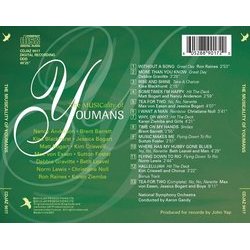The Musicality of Youmans
Inscreva-se agora!
Mantenha-se mais informado e tenha acesso à informação de colecionadores!
Mantenha-se mais informado e tenha acesso à informação de colecionadores!
| # | Rastrear | Artista/Compositor | Duração |
|---|---|---|---|
| 1. | WITHOUT A SONG (Great Day) | Ron Raines | |
| 2. | MORE THAN YOU KNOW (Great Day) | Debbie Gravitte | |
| 3. | RISE AND SHINE (Take A Chance) | Klea Blakhurst | |
| 4. | SOMETIMES I'M HAPPY (A Night Out) | Matt Bogart and Nancy Anderson | |
| 5. | TEA FOR TWO (No, No, Nanette) | Max von Essen and Jessica Bogart | |
| 6. | I WANT A MAN (Rainbow) | Christiane Noll | |
| 7. | WHY, OH WHY? (Hit The Deck) | Karen Ziemba and Girls | |
| 8. | TIME ON MY HANDS (Smiles) | Brent Barrett | |
| 9. | MUSIC MAKES ME (Flying Down To Rio) | Sutton Foster | |
| 10. | WHERE HAS MY HUBBY GONE BLUES (No, No, Nanette) | Beth Leavel and Men | |
| 11. | FLYING DOWN TO RIO (Flying Down To Rio) | Norm Lewis | |
| 12. | HALLELUJAH (Hit The Deck) | Kim Criswell and Chorus | |
| 13. | TEA FOR TWO (Complete Version) (No, No, Nanette) | Max von Essen and Jessica Bogart |
In the 1920s, Vincent Youmans led a vanguard of fresh innovative songwriters whose melodies and shows were revolutionizing Broadway. Youmans, along with his peers Rodgers, Gershwin and Berlin, established a new sound of American popular music, and revitalized Broadway in the process, ushering in its first Golden Age. Widely regarded as a master melodist, Youmans’ modern and streamlined melodies were tailor made for the jazz age, perfectly underscoring its racing pulse and optimistic American attitude.
Vincent Millie Youmans was born in 1898 into a wealthy New York City family. He found music at an early age, and, declining to take over the family’s hat business, pursued music instead. Like George Gershwin before him (they were born one day apart), his first entré to the music business was as a song-plugger for a sheet music publisher, and then as a rehearsal accompanist for shows, in his case Victor Herbert operettas. His gifts were obvious, and success came quickly. At the age of 23, he landed his first Broadway composing credit with Two Little Girls in Blue (1921), which enjoyed a modest run, and generated two song hits. Youmans wrote music for half the score, teaming up with an equally young Ira Gershwin who penned the lyrics under the non de plume Arthur Francis. Two years later, Youmans enjoyed his first hit show with Wildflower (again sharing composing duties) with lyrics this time by Oscar Hammerstein II. Both shows yielded hit songs for the young composer, and producers took notice. Later that same year, Broadway saw his Mary Jane McKane (co-composing again, with lyrics by Hammerstein) and Lollipop, (lyrics by Zelda Sears), which was his first solo composing credit. In 1924, his career exploded with the worldwide success of No, No Nanette, and the entire world was soon dancing to Youmans’ music. Fifty years later, Broadway again embraced the show in an effervescent revival directed by Busby Berkeley. Utilizing the sparkling orchestrations created for that 1971 production by Ralph Burns, Max Von Essen and Jessica Boevers duet on “Tea for Two”, which is followed by the first complete recording of Luther Henderson’s spectacular dance arrangement for the song. Also from that revival is “Where-Had-My-Hubby-Gone Blues,” sung by Tony winner Beth Leavel and men’s chorus.
No, No Nanette brought Youmans an unprecedented fame. He was recognized as a master melodist, and a leading light on Broadway. His next show was a star vehicle for Bea Lillie called Oh, Please! (1926), which wasn’t a success, although it offered the hit song “I Know That You Know”. In 1927, Youmans had another smash, and this time he produced the show as well. For Hit the Deck! he teamed with lyricists Clifford Grey and Leo Robin, and reunited with Louise Groody, star of No, No Nanette. With its rowdy sailors and onboard hijinks, this “nautical musical comedy” provided a stimulating vehicle for the composer, who again delivered a knockout score. Its two hit songs were “Sometimes I’m Happy,” here crooned by Nancy
Vincent Millie Youmans was born in 1898 into a wealthy New York City family. He found music at an early age, and, declining to take over the family’s hat business, pursued music instead. Like George Gershwin before him (they were born one day apart), his first entré to the music business was as a song-plugger for a sheet music publisher, and then as a rehearsal accompanist for shows, in his case Victor Herbert operettas. His gifts were obvious, and success came quickly. At the age of 23, he landed his first Broadway composing credit with Two Little Girls in Blue (1921), which enjoyed a modest run, and generated two song hits. Youmans wrote music for half the score, teaming up with an equally young Ira Gershwin who penned the lyrics under the non de plume Arthur Francis. Two years later, Youmans enjoyed his first hit show with Wildflower (again sharing composing duties) with lyrics this time by Oscar Hammerstein II. Both shows yielded hit songs for the young composer, and producers took notice. Later that same year, Broadway saw his Mary Jane McKane (co-composing again, with lyrics by Hammerstein) and Lollipop, (lyrics by Zelda Sears), which was his first solo composing credit. In 1924, his career exploded with the worldwide success of No, No Nanette, and the entire world was soon dancing to Youmans’ music. Fifty years later, Broadway again embraced the show in an effervescent revival directed by Busby Berkeley. Utilizing the sparkling orchestrations created for that 1971 production by Ralph Burns, Max Von Essen and Jessica Boevers duet on “Tea for Two”, which is followed by the first complete recording of Luther Henderson’s spectacular dance arrangement for the song. Also from that revival is “Where-Had-My-Hubby-Gone Blues,” sung by Tony winner Beth Leavel and men’s chorus.
No, No Nanette brought Youmans an unprecedented fame. He was recognized as a master melodist, and a leading light on Broadway. His next show was a star vehicle for Bea Lillie called Oh, Please! (1926), which wasn’t a success, although it offered the hit song “I Know That You Know”. In 1927, Youmans had another smash, and this time he produced the show as well. For Hit the Deck! he teamed with lyricists Clifford Grey and Leo Robin, and reunited with Louise Groody, star of No, No Nanette. With its rowdy sailors and onboard hijinks, this “nautical musical comedy” provided a stimulating vehicle for the composer, who again delivered a knockout score. Its two hit songs were “Sometimes I’m Happy,” here crooned by Nancy



